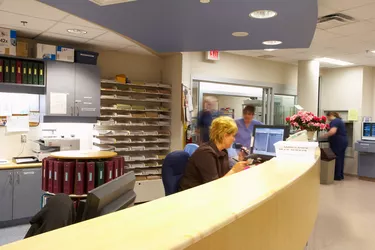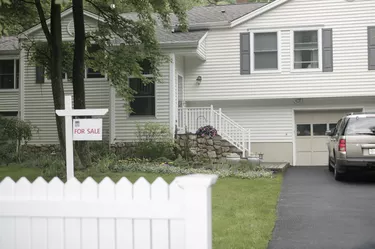
A lien is a legal right to a portion of an asset to satisfy a debt. Many creditors can put liens on your home or other property making the title to the property encumbered. You cannot sell the property without first satisfying the lien by paying the debt back. If you owe a hospital a substantial amount of money for uninsured medical expenses, it can pursue the debt, including placing a lien on your house.
Hospital's Collection Process
Video of the Day

Every hospital has its own policies for collecting on unpaid medical bills. Many states also have limitations on what steps hospitals can take to satisfy the debt. Some of these limitations include how long a hospital must wait to turn over an unpaid bill to a collection agency and in what circumstances they are not allowed to seek a lien to satisfy a legal judgment. Most hospitals will first attempt to make a payment arrangement with you. You may be able to pay the bill in monthly installments over time. Making an arrangement that you can afford is your best option. If an agreement cannot be reached, the hospital will eventually turn the debt over to a collection agency that will likely aggressively pursue the debt. If those efforts are ignored, the hospital can take you to court and get a judgment against you for the debt, interest and other costs and fees. This judgment will be reported on your credit report and, in most states, the hospital can put a lien on your property in the amount of the judgment.
Video of the Day
Repercussions of Lien

When a lien is placed on your home or other property, it is registered on the property's title. This means that the property cannot be sold until the lien is satisfied, which usually happens with the proceeds of the sale. However, potential purchasers can be nervous about properties without clear titles and it may be more difficult to sell your house. Once the debt is paid in full, the lien is lifted and the title becomes clear. Check to ensure that the lien was lifted properly after you have satisfied the debt.
Can They Take My House?

In most states, a lien holder can force the sale of a home to satisfy the debt. Some states have consumer protections in place to halt such action in cases of low income or disabled debtors. A forced sale is rarely done in practice and it is more likely that the lien will simply remain until you sell the house. If you die, the lien will transfer to the beneficiary of the property and he will have to satisfy the debt before he can dispose of the property.
Working With Hospital

As with any other debt delinquency situation, it is always best to continue to communicate with the hospital and come up with a repayment arrangement that you can afford and can adhere to. Check with your state's consumer protection agency to see if there is any financial aid that you may be eligible for.